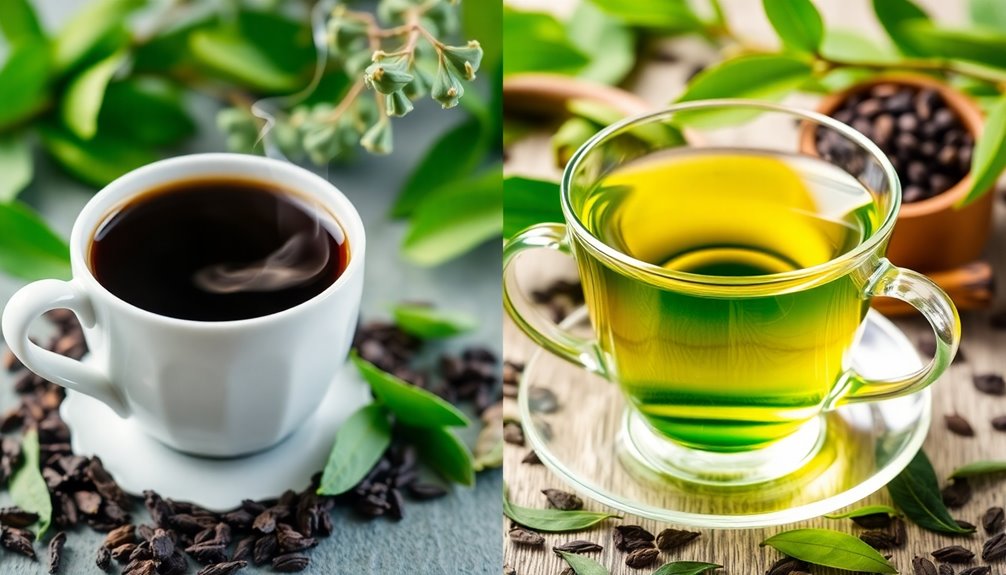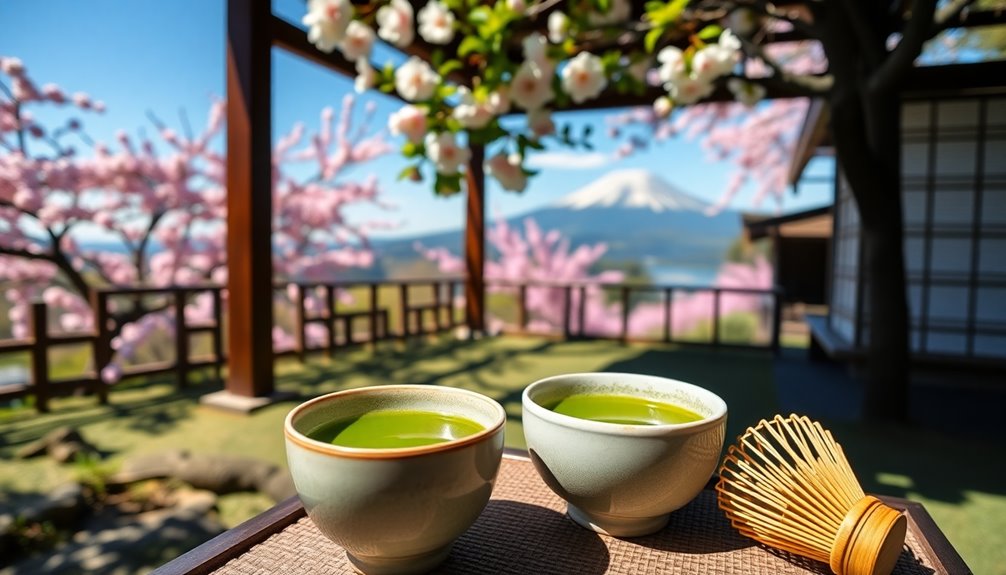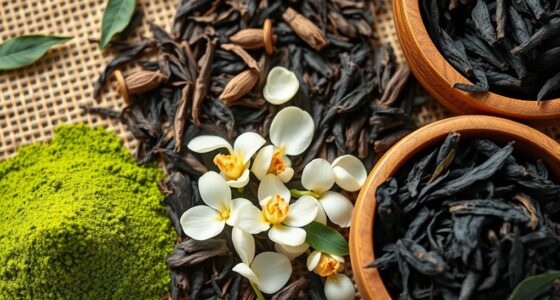When choosing between black and green tea, it's all about your taste and needs! Black tea has a bold flavor and higher caffeine, perfect if you enjoy a stronger kick. It's fully oxidized, giving it a rich taste. On the other hand, green tea is lighter and less processed, with less caffeine. It's packed with antioxidants like EGCG, which are great for your health. Both types can improve alertness and relaxation, but watch your intake! If you're curious about how to enjoy these teas fully, there's so much more to discover about their benefits and brewing techniques!
Key Takeaways
- Black tea offers a stronger flavor and higher caffeine content, making it ideal for those needing an energy boost.
- Green tea has a lighter taste and lower caffeine, suitable for those sensitive to caffeine or preferring a milder option.
- Both teas are rich in antioxidants; choose black tea for theaflavins or green tea for higher EGCG levels.
- Consider cultural significance and personal preferences; black tea is central to British culture, while green tea is integral to Japanese traditions.
- Balance health benefits with consumption; 3-5 cups daily is optimal to avoid adverse effects from excessive intake.
Introduction
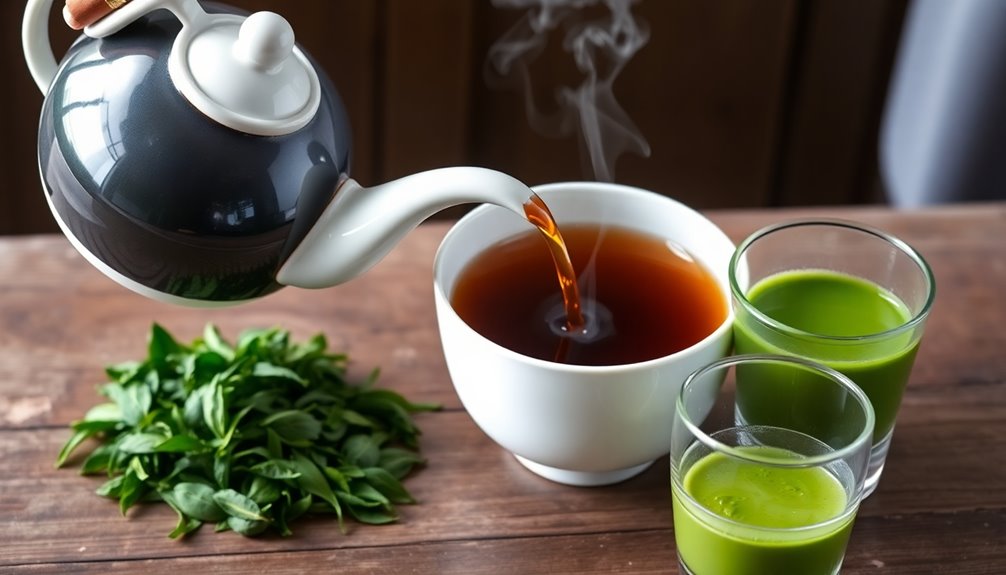
When it comes to choosing between black and green tea, have you ever wondered what sets them apart? Both types of tea come from the same plant, Camellia sinensis, but they're processed differently.
Black tea is fully oxidized, giving it a stronger flavor and higher caffeine content. On average, an 8 oz cup of black tea has 40-70 mg of caffeine, while green tea has 20-45 mg per cup.
If you're sensitive to caffeine, green tea might be the better choice for you.
Both teas offer unique health benefits. Green tea is famous for its rich catechins, especially EGCG, which may help with weight loss and even support your brain health. On the other hand, black tea contains theaflavins that are known to promote heart health.
Regularly drinking either tea can improve your overall wellness, helping with heart health, boosting cognitive function, and supporting weight management.
Your choice between black and green tea might depend on your personal health goals and flavor preferences. So, which one will you choose to sip today? Each offers something special, making your tea time a delightful experience.
Tea's Antioxidant Properties
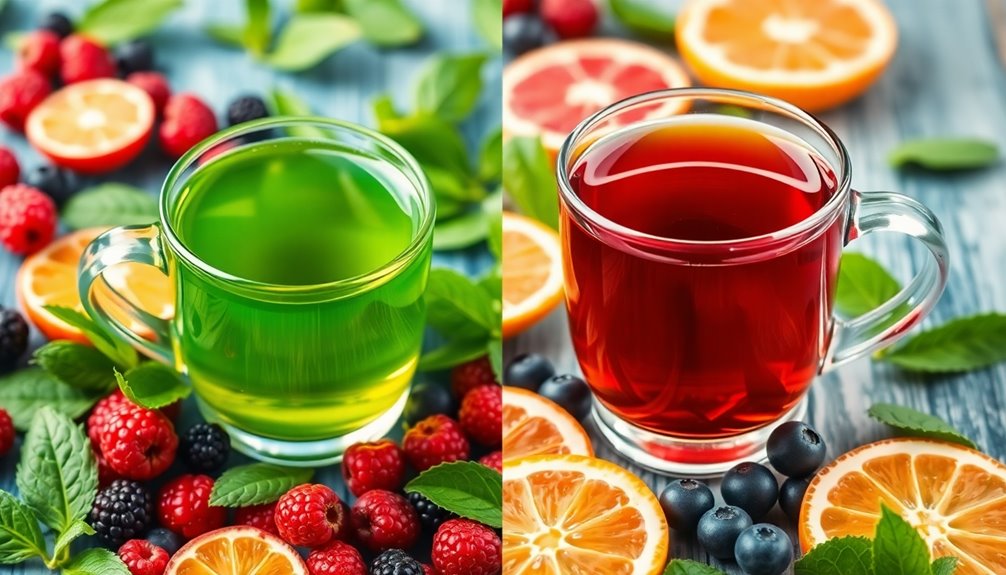
Tea's antioxidant properties are one of its most appealing benefits, making it a popular choice for health-conscious individuals. Both green tea and black tea are rich in antioxidants, especially polyphenols, which help combat oxidative stress and reduce inflammation in your body.
Green tea shines with high levels of epigallocatechin gallate (EGCG), a powerful antioxidant that can provide you with 200-300 mg per cup. On the other hand, black tea contains theaflavins, unique antioxidants formed during oxidation, making up about 3-6% of its polyphenol content.
Regularly enjoying either tea can lead to improved heart health. Their antioxidants help lower bad cholesterol levels and reduce blood pressure, which is great for your cardiovascular health.
Some studies even suggest that the antioxidant properties of tea may lower your risk of chronic diseases like cancer and cardiovascular diseases.
Caffeine Levels Vary Significantly
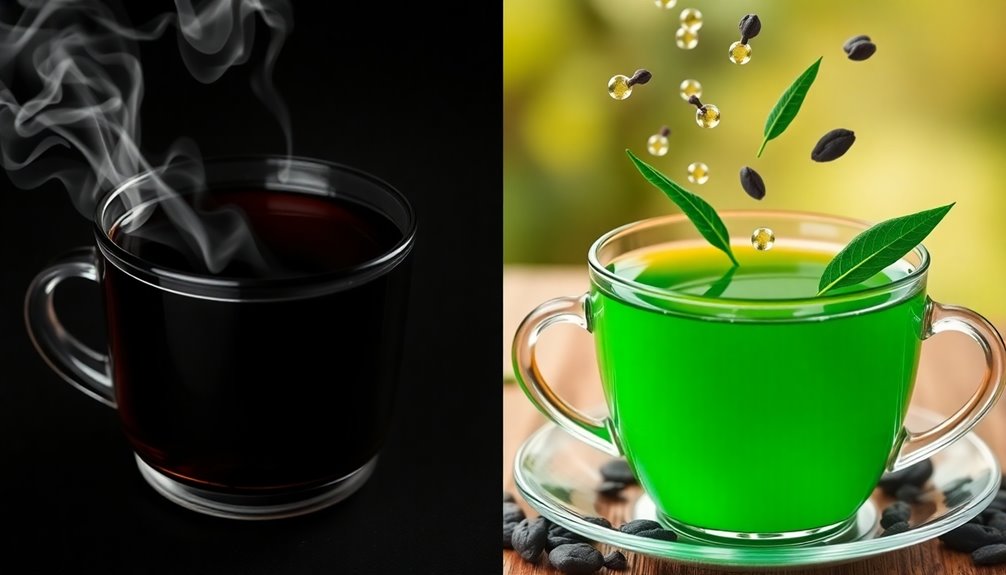
The caffeine content in black and green tea varies significantly, impacting your choice depending on your preferences and needs.
Black tea generally contains higher caffeine levels, averaging between 40-70 mg per 8 oz cup, while green tea has about 20-45 mg per cup. If you're looking for lower caffeine, green tea might be the way to go.
However, if you want a boost, consider matcha green tea, which can have up to 88 mg of caffeine per 8 oz serving.
The caffeine content in both black and green tea can change based on tea variety, processing methods, and brewing techniques. So, how you brew your tea really matters!
Moderate caffeine intake can enhance alertness and mood, with recommendations suggesting up to 400 mg daily for adults.
But if you're one of those individuals sensitive to caffeine, you might prefer green tea for its lower caffeine content compared to black tea.
In the end, whether you choose black or green tea, understanding their caffeine levels can help you make the best choice for your day!
Cultural Significance of Tea

Although many people enjoy tea for its flavor and health benefits, its cultural significance runs much deeper, reflecting the values and traditions of various societies.
In Japan, the tea ceremony highlights mindfulness and aesthetic appreciation, especially when sipping matcha green tea. This beautiful ritual showcases the importance of focus and tranquility, often enhanced by the use of specific utensils that elevate the experience. The practice of tea ceremonies can also contribute to the health benefits of tea, promoting relaxation and mental clarity.
In British culture, black tea is a staple, often enjoyed during social gatherings and afternoon tea, a tradition dating back to the 19th century.
Similarly, in China, tea culture includes both green and black tea, deeply rooted in history and philosophy. You can experience this through tea houses and traditional tea-drinking rituals, where the preparation method can significantly impact the flavor.
In India, chai, primarily made with black tea and spices, plays a crucial role in daily life and hospitality, showcasing unique regional practices.
As global tea consumption rises, you'll find tea festivals celebrating the diverse flavors, health benefits, and cultural heritage of both green and black tea.
Through these experiences and rituals, many families create cherished memories, similar to the father-daughter bond that strengthens connections across generations.
Whether you prefer green or black tea, understanding its cultural significance can deepen your appreciation and connection to this beloved beverage.
Health Risks of Excessive Consumption
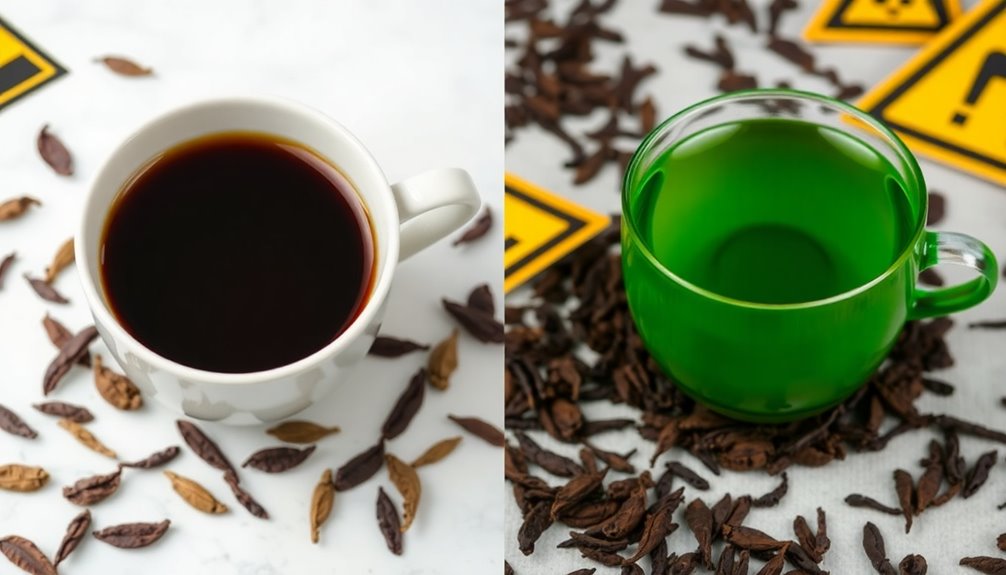
Enjoying tea in moderation can enhance your experience, but excessive consumption brings potential health risks. Drinking more than 4-5 cups of black tea daily can lead to headaches, insomnia, and an increased heart rate due to its higher caffeine content. Additionally, rapeseed honey can be a great natural sweetener for your tea, providing various health benefits.
On the other hand, if you drink over 5 cups of green tea, you might face stomach irritation and problems with certain medications, especially anticoagulants because of its vitamin K content. Both black and green tea can affect iron absorption if consumed excessively. This is particularly important for people with iron deficiency or anemia, as it might lead to symptoms of anemia. It's essential to keep this in mind if you love your tea!
Additionally, taking too many green tea extract supplements has been linked to liver toxicity, highlighting the need for moderation even with these health-promoting beverages. Moreover, energy-efficient technology in heat pumps can serve as a reminder of how balance is key in both consumption and energy use.
Daily intake of 3-5 cups of tea is generally considered safe and can even provide beneficial effects. Remember, it's all about enjoying your tea thoughtfully and keeping an eye on how much you drink!
Practical Applications
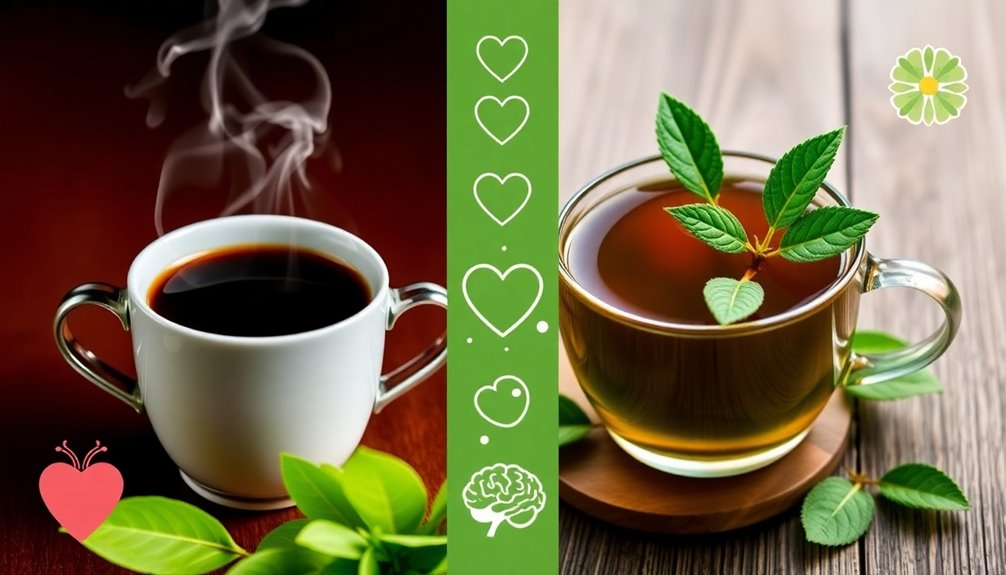
When choosing your daily tea, consider your personal health goals and preferences to maximize the benefits. If you're sensitive to caffeine, you might prefer green tea, which has 25-29 mg of caffeine per 8 oz serving, compared to 25-48 mg in black tea. Both types can improve heart health, so aim for 2 to 4 cups daily to enjoy their flavonoids. Additionally, both teas can support joint function similar to the effects of turmeric, making them a great addition to a pain management routine. Herbal teas, which are naturally caffeine-free, can also provide a calming alternative if you're looking to reduce caffeine intake. Essential oils for pain relief may also complement your tea choices to enhance your overall wellness. Furthermore, air purifiers can help create a healthier environment by improving indoor air quality, which is beneficial for respiratory health.
If weight management is your focus, green tea could help with fat burning during exercise, while black tea supports gut bacteria positively. To get the most antioxidants, brew green tea at lower temperatures, around 160-185°F, for 2-3 minutes. For black tea, use higher temperatures of 200-212°F and steep for 3-5 minutes.
Incorporating both teas into your routine can bring a mix of benefits. You'll enjoy improved mental alertness from the caffeine in both, while the L-theanine in tea can help you relax. Additionally, both green and black tea contain antioxidants that combat oxidative stress, which may contribute to overall health and disease prevention. Herbal teas, known for their unique flavors and benefits, can also complement your daily tea choices for added variety and health advantages.
Frequently Asked Questions
Is Green Tea Any Better for You Than Black Tea?
When you compare green tea to black tea, you'll find green tea's higher catechin levels boost metabolism and offer unique cognitive benefits. However, black tea's antioxidant properties also provide heart health advantages. Both have their strengths.
What Is the Healthiest Tea to Drink Daily?
When choosing the healthiest tea to drink daily, consider your health goals. Both black and green tea offer unique benefits; you'll want to enjoy them based on your caffeine sensitivity and personal taste preferences.
Is Green Tea or Black Tea Better for Gut Health?
When considering gut health, both green and black tea offer benefits. You'll find that black tea promotes beneficial bacteria growth, while green tea's catechins support gut health. Your choice depends on personal preference and health goals.
Is It Better to Drink Black Coffee or Green Tea in the Morning?
When deciding between black coffee or green tea in the morning, consider your caffeine needs. If you want a strong energy boost, go for coffee; if you prefer relaxation and antioxidants, choose green tea.
Conclusion
So, whether you choose black tea or green tea, both have unique benefits that can fit into your lifestyle. If you want more caffeine and a bold flavor, go for black tea. If you're looking for a lighter taste and extra antioxidants, green tea is your best bet. Just remember to enjoy them in moderation. So, grab your favorite cup, sip slowly, and see which one you like best. Happy tea tasting!

